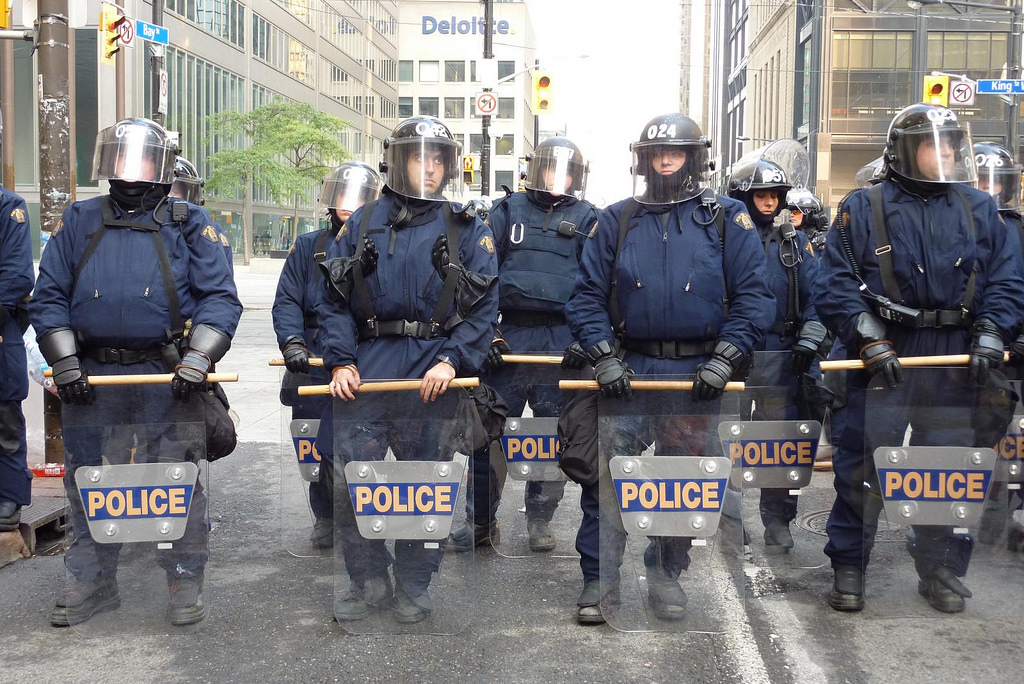Like this article? rabble is reader-supported journalism. Chip in to keep stories like these coming.
It’s been six years since the G20 summit was held in Ontario and demonstrations were held over multiple days in Toronto in the last days of June to coincide with the international event.
Those same demonstrations would lead to the largest mass arrest in Canadian history, with over 1,000 people detained or charged with a variety of offences, but only a small minority of those processed through the infamously brutal Eastern Avenue detention centre were actually convicted of any alleged crime.
Most notoriously was the mass kettle orchestrated by the police on Sunday June 27, 2010, at the downtown intersection of Queen Street West and Spadina Avenue in the middle of the pouring rain.
The cost of holding the summit was eventually pegged at over $1 billion — this included everything from security costs to the construction of the fake lake at the media centre in Huntsville.
The Canadian Civil Liberties Association eventually released a report, along with the National Union of Public and General Employees (NUPGE), titled Breach of the Peace that denounced the mass arrests as illegal and unconstitutional because the police could not justify that all those arrested or detained — from activists to members of the general public who got swept up in the arrests or numerous mass kettles by the police — were subjected to police intervention under the reasonable or probable grounds that they were either about to commit a crime or already had done so.
Litigation and an attempt by activists to hold the police accountable still continues today, though it seems that the police would rather the issue get buried and remain untouched. This includes moving forward in the biggest attempt to hold them accountable through class action lawsuits.
To this end, the Toronto Police Services Board (TPS) have recently filed court documents to request that the Supreme Court of Canada hear an appeal in the G20 class action lawsuits, regarding the issue of “certification” as a class action in itself.
In August 2014, the Ontario Divisional Court approved the G20 class actions as certified, and thus could proceed as a class action type suit. The TPS appealed this ruling to the Ontario Court of Appeal and in April, 2016, the Court of Appeal reaffirmed its ruling that the G20 class actions can proceed.
This has unfortunately not stopped the TSP from attempting to stop the class action from going to trial, this time by requesting a further appeal, all the way to the Supreme Court of Canada.
From here, the case can break over in one of two ways.
The Supreme Court of Canada can decide to give the TPS leave to appeal. If this happens, the courts will have to rule on the issue of case certification, most likely not until next year, further dragging this case out.
Or the Supreme Court of Canada can rule to dismiss the request for an appeal hearing, which would mean that the previous Ontario Court of Appeals decision would stand, thus paving the way for the G20 class action lawsuit to go to trial.
Since the G20 Summit occurred more than five years ago, I’m torn. On one hand, I want to put the whole G20 trauma behind as a city behind us. But from the perspective of the people who were detained in the deplorable conditions in the Eastern Avenue detention centre and the community organizers who had their world turned upside down through show trials and excessive policing of their lives, the state should be held accountable for granting the numerous police forces permission to run rogue through Toronto’s streets.
This includes police officers charged with removing their badge numbers and IDs to prevent citizens from holding forces and individual officers accountable for their actions.
In August 2015, the Toronto Police disciplinary hearing found Superintendent Mark Fenton guilty of two charges of unlawful arrest and one charge of discreditable conduct. Fenton was the officer in charge during the two most notorious kettling incidents of the G20.
Toronto police Constable Babak Andalib-Goortani was tried and convicted of using excessive force while arresting activist Adam Nobody and ordered to serve a year of probation and perform 75 hours of community service. He had previously been ordered to serve a 45-day jail sentence, but had appealed that sentence.
In September 2013, Andalib-Goortani was convicted of assault with a weapon while arresting Adam Nobody as he protested on the lawn of Queen’s Park on Saturday June 26, 2010 — Queen’s Park had been declared the official protest zone by the city, which meant many people congregated there under the pretense that they would be permitted to demonstrate.
He was wearing his name tag, but media had to appeal to the public for anyone who had taken photos or video of the incident to come forward.
Like this article? rabble is reader-supported journalism. Chip in to keep stories like these coming.
Image: Flickr/andrewarchy



